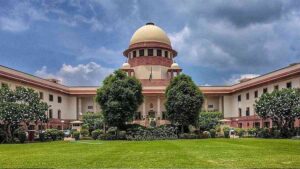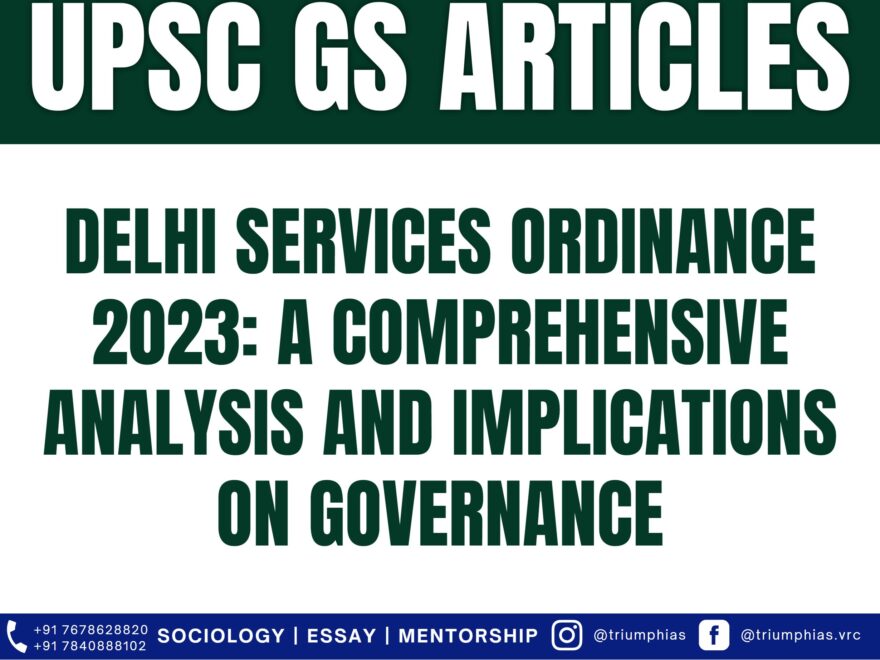Delhi Services Ordinance
(Relevant for General Studies Paper Prelims/Mains)

The President promulgated the Government of National Capital Territory of Delhi (Amendment) Ordinance, 2023 in May 2023, aiming to establish a comprehensive administration scheme for services in Delhi.
This ordinance was introduced in response to a Supreme Court decision that granted control of services in Delhi, excluding police, public order, and land, to the elected government. The objective of the ordinance is to establish a National Capital Civil Service Authority (NCCSA) responsible for transferring and conducting disciplinary proceedings against Group-A officers from services within the National Capital Territory (NCT) of Delhi.
The issuance of this ordinance grants the Lieutenant Governor of Delhi the authority to oversee services, thereby challenging the elected government’s jurisdiction in matters of officials’ transfers and postings. This development raises significant constitutional concerns regarding the delicate balance of power between the elected government and the Lieutenant Governor.
Issues with the Ordinance
- In May 2023, the Supreme Court explicitly acknowledged and established the concept of the “triple chain of accountability.”
- The triple chain of accountability is a crucial element of representative democracy and operates in the following manner: Civil servants are answerable to the cabinet. The cabinet is answerable to the legislature, specifically the Legislative Assembly. The Legislative Assembly is periodically answerable to the electorate.
- Any action that disrupts or breaks this “triple chain of accountability” fundamentally undermines the fundamental constitutional principle of representative governance, which forms the foundation of our democracy.
- The promulgation of the ordinance has sparked a power struggle between the elected government and the Lieutenant Governor.
- The elected government argues that the ordinance diminishes their authority and infringes upon the Constitution. Under the ordinance, the Lieutenant Governor is bestowed with the authority to appoint crucial bureaucratic positions in Delhi.
- Furthermore, the Lieutenant Governor is now entrusted with the power to transfer and assign officials, a responsibility that was previously held exclusively by the elected government. As a result of the ordinance, there is a prevailing sense of confusion and uncertainty among civil service officers working within Delhi government departments.
- Additionally, the delivery of public services and welfare programs in Delhi has been impacted by this development.
Possible Consequences of the Ordinance
- The situation has the potential to generate a constitutional dilemma and a struggle for power between the central government and the Delhi administration regarding the management of civil services in the capital city.
- The autonomy and democratic functioning of the Delhi government, as well as the mandate given by the electorate, could be undermined as a result.
- The smooth and efficient administration and governance of Delhi may be hindered due to the uncertainty and confusion surrounding the roles and responsibilities of civil service officers. Legal disputes and judicial examination may arise since the ordinance appears to contravene both the Supreme Court’s ruling and Article 239AA of the Constitution.
Arguments Related to the Ordinance

Argument in Favour
- The ordinance serves as a means to strike a balance between the interests of the people of Delhi and the broader democratic will of the entire nation, as represented by the President of India.
- By implementing the ordinance, the administration of services in the national capital can benefit from the input and oversight of the central government, ensuring the maintenance of public order, security, and development.
- Respecting the role of the elected Delhi government, the ordinance grants representation in the National Capital Civil Services Authority (NCCSA), which will make decisions on service-related matters through majority voting.
- In accordance with Article 239AA of the Constitution, which designates Delhi as a Union Territory with a legislative assembly, the ordinance aligns with the provision that allows Parliament to enact laws on subjects typically under the jurisdiction of states, including services.
- It is important to note that the ordinance does not contravene the Supreme Court’s judgment, which recognized the legislative and executive powers of the Delhi government over services but did not prohibit Parliament from legislating on the same matter.
Argument Against
- The ordinance undermines the fundamental principles of representative democracy and responsible governance, which form the cornerstone of India’s constitutional framework.
- The ordinance strips the elected Delhi government of its authority over services, despite having received a clear mandate from the people of Delhi to legislate and administer on their behalf.
- Furthermore, the ordinance diminishes the role of the Chief Minister and the council of ministers to mere figureheads, as their decisions can be overruled by two bureaucrats in the NCCSA who ultimately answer to the Lieutenant Governor and the Centre. In addition, the ordinance disregards and renders ineffective the Supreme Court’s judgment, which established that the Delhi government possesses legislative and executive powers over services in the national capital, excluding matters pertaining to public order, police, and land.
- Moreover, the ordinance infringes upon Article 239AA of the Constitution, which grants Delhi special status as a Union Territory with a legislative assembly and envisions a harmonious relationship between the Centre and the Delhi government.
During the process of resolving the matter, it is crucial for all parties involved to exhibit a dedication to preserving constitutional principles, which encompass democratic governance, the division of powers, and the protection of the rights of elected officials.
To master these intricacies and fare well in the Sociology Optional Syllabus, aspiring sociologists might benefit from guidance by the Best Sociology Optional Teacher and participation in the Best Sociology Optional Coaching. These avenues provide comprehensive assistance, ensuring a solid understanding of sociology’s diverse methodologies and techniques.
Delhi Services Ordinance, National Capital Territory, Governance, Lieutenant Governor, Elected Government, Constitutional Concerns, Supreme Court Decision, Power Struggle, Civil Services, Ordinance Consequences, Democratic Functionin, Best Sociology Optional Teacher, Best Sociology Optional Coaching, Sociology Optional Syllabus.
Follow us :


https://t.me/VikashRanjanSociology
Find More Blogs
|
Scope of the subject and comparison with other social sciences |
|||
|
|
|
|
Modernity and social changes in Europe |

